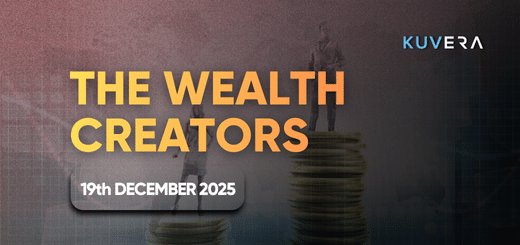In this edition, we talk about Elon Musk-led electric vehicle company Tesla’s plans for a long-awaited India entry. We also talk about Suzuki adjusting its strategy in India, how Indian drugmakers are preparing for planned tariff hikes by Donald Trump, and two other frauds that authorities unearthed in Mumbai and Hyderabad this week.
Welcome to Kuvera’s weekly digest on the most critical developments related to business, finance, and the markets.
tl;dr Hear the article in brief instead?

On April 1, 2016, Elon Musk unveiled a prototype of his electric vehicle company Tesla’s Model 3 compact sedan at an event full of pomp and show in the city of Hawthorne outside Los Angeles. The event created a lot of buzz. The new car, its most affordable then, was considered critical for Tesla to boost EV sales and challenge legacy carmakers like Ford, GM, and Toyota. By the end of the first day, Tesla had received orders for nearly 180,000 Model 3 cars. And Musk estimated that, at an average selling price of $42,000, those orders totalled nearly $7.5 billion.
The unveiling created excitement far away in India, too, after Musk tweeted that he had opened the booking page for buyers across several countries. And some Indians did get into the queue, writing $1,000-cheques to book their dream cars. Among those were Paytm founder Vijay Shekhar Sharma and venture capitalist Mahesh Murthy.
A lot has changed in the past nine years. Tesla upended the auto industry worldwide and emerged as the biggest EV company. Musk is now the richest person in the world and the second most powerful in America as the right-hand man of President Donald Trump. Sharma, too, became a rich man and Paytm floated its IPO (and then we all know what happened). But the Model 3 or any other Tesla car never landed in India. That is now set to change.
For nearly a decade now, Tesla has been looking to enter India. It has explored setting up showrooms and even a factory in India multiple times. It also complained about India’s high tariffs on car imports and halted India entry plans in 2022. The buzz got louder last year just before the Lok Sabha elections when the government changed its EV policy, which we wrote in our newsletter then, but Musk ditched a travel plan to India and instead flew to China.
Modi and Musk, who first met in 2015, again met recently in the US after Trump was reelected as President. This meeting now appears to have set the ball rolling. Tesla hasn’t disclosed its plans and we don’t know what concessions it managed to wrangle out of the government, but we do know that it has advertised to hire people for 13 mid-level roles. It has also selected locations for two showrooms in New Delhi and Mumbai, and plans to sell imported EVs in India, shipping the cars from Germany, media reports say.
For Tesla, the India entry is critical as it faces a slowdown in global sales after surging in 2023 and 2024 because of the post-pandemic demand. Tesla’s global sales fell 1% in 2024, recording its first-ever drop. Sales are falling further in 2025. Tesla sales slumped across Germany, France, the UK, and China in January. Meanwhile, competition from Chinese companies such as BYD is rising. In fact, BYD last year almost matched Tesla sales globally.
BYD also imports its cars to India, where the EV market is a fraction of the total industry and is dominated by Tata Motors, Mahindra & Mahindra, and a joint venture of JSW and China’s MG Motor. Tata Motors and M&M shares have slipped as Tesla’s plans became clearer. Both companies as well as JSW-MG have accelerated their EV plans in recent years. So, while Tesla may soon start rolling here, it won’t find the going so easy on India’s potholed roads.
Shifting Gears
While Tesla is set to enter India, the carmaker that has been around for more than four decades is adjusting its plans.
Japanese carmaker Suzuki Motor, the parent of industry leader Maruti Suzuki, has cut its sales target in India and said it now plans to launch only four EVs instead of the six planned earlier.
Suzuki said this week it aims to sell about 2.5 million cars annually in India by March 2031. This is down from the 3-million target set in October 2023. It also plans to ramp up its SUV line-up in view of changing customer tastes but has removed the 2031 deadline to double its production capacity to 4 million units a year.
Meanwhile, it plans to grow its global sales by a third to 4.2 million vehicles by 2030. But it noted that EV sales, particularly in Europe, are slowing and that it is instead working on other technologies such as hybrids and biogas.
Suzuki has been losing market share in India in recent years as sales of small cars—its forte—slumped while larger, more feature-rich cars and SUVs offered by Tata Motors, M&M and the Hyundai-Kia group gained ground.
Of course, Suzuki isn’t giving up on India. It intends to increase its market share, which fell from 51% before the pandemic to 41% now, back to 50%, although it has shifted the deadline by five years to 2031.
India also remains Suzuki’s most important market and will get nearly 60% of its planned investment globally. India will also be Suzuki’s hub for exports to the Middle East and Africa.
Will the change in strategy help Suzuki claw back its lost market share and boost sales? Let’s hope it does!
The Bitter Pill
Maruti and Tesla aren’t the only companies rewriting their playbooks. A large number of companies across the world, including in India, are doing just that ever since Donald Trump returned as the US president a month ago. This week, it was the turn of pharmaceutical companies in India.
Trump said this week he intends to impose import duties of 25% or higher on semiconductors and pharmaceuticals, and raise the tariffs substantially thereafter. This has sent pharmaceutical companies into a tizzy.
The US is the biggest market for most Indian pharma companies. In 2023-24, Indian drugmakers exported products worth $8.7 billion to the US, according to the Pharmaceuticals Export Promotion Council of India (Pharmexcil). This was a little less one-third of total pharma exports from India.
If the tariffs do come into place, they can hurt several companies. India’s largest drugmaker Sun Pharma, for instance, gets a third of its revenue from the US. For Dr Reddy’s Labs, the US and other North American markets account for almost half of its annual revenue. Cipla, Biocon, Lupin, Glenmark Pharma and Zydus also get anywhere between 25-40% of their sales from that region.
While the tariffs may force these companies to look for new growth markets, the US itself may turn out to be a big loser. For, Indian drugmakers mostly export cheap generic drugs to the US. These medicines help US consumers keep their own healthcare costs low. The imposition of tariffs may prompt the companies to pass on the price hikes to the consumers.
Indian companies say the planned move will be bad for American consumers themselves and that they hope bilateral talks could help avoid the tariffs. So far, however, Trump remains adamant.
In an interview to Fox News this week, he said that he told Prime Minister Modi during their meeting in White House that the US would impose reciprocal tariffs on every country that levies a tax on American imports. India has already cut some tariffs on American bikes and bourbon, and is likely to offer a sweet deal to Tesla as well. Will that be enough for Trump to walk back on pharma tariffs? We will have to wait and watch.
Scams and Frauds
Last week, we wrote about the stock market scams that the Securities and Exchange Board of India had unearth. This week, we talk about two incidents of fraud unrelated to the stock market that have come to light since then.
On Feb. 13, the Reserve Bank of India stopped Mumbai-based New India Co-operative Bank from granting new loans and suspended deposit withdrawals for six months. The following day, it superseded the bank’s board of directors and appointed a former State Bank of India executive as the administrator. The ban on withdrawals—the bank has total deposits of Rs 2,436 crore—shocked customers and created chaos.
The RBI cited “supervisory concerns emanating from the recent material developments” and “certain material concerns emanating from poor governance standards” in the bank for its decision.
What does this gobbledygook actually mean?
The regulator didn’t give any explanations for its decisions. Several media reports, however, pointed out the problems that plunged the bank into crisis. The reports say New India Co-op had been grappling with losses for the last two years. It posted a loss of Rs 22.8 crore for 2023-24 and Rs 30.75 crore loss the year before.
Later this week, the Mumbai police arrested Hitesh Mehta, general manager and head of accounts at the bank, for allegedly siphoning off Rs 122 crore. Mehta was allegedly giving depositors’ money to traders as unsecured loans during the pandemic. He also allegedly gave Rs 70 crore to a real estate developer Dharmesh Paun, who has also been arrested.
In another fraud, this time in Telangana, police arrested two people after a case was filed against a company called Falcon Invoice Discounting. The police say Falcon collected Rs 1,700 crore from almost 7,000 investors since 2021 and promised returns of up to 22% by claiming to connect them with companies such as Amazon and Britannia.
That never happened, of course, because it was a Ponzi scheme where Falcon was paying money to investors by collecting money from other investors. The police estimate that Falcon has returned only about half the money it collected. The police are now searching for Falcon’s founder Amardeep Kumar.
In both cases, investigations are still going on, so we don’t have the full picture yet. What is clear, however, is that the number of scams and frauds, whether in the stock market or through fake apps or websites, is on the rise. So, please be vigilant and don’t fall prey to scamsters.
Market Wrap
India’s stock markets remained in the negative zone this week as foreign portfolio investors continued to sell and Trump’s tariff warnings weighed. The BSE Sensex ended down 0.8% while the Nifty 50 slipped almost 0.6%.
All IT stocks closed with losses this week, led by TCS and Infosys. Drugmakers Sun Pharma and Dr Reddy’s Labs slipped more than 3% each. HUL, Britannia, Tata Consumer and Trent ended lower as concerns about weakening consumer demand persist. Bharti Airtel, ITC and ICICI Bank were the other major losers.
The biggest loser this week was M&M, which fell almost 9% this week. Tata Motors and Maruti Suzuki also lost ground.
PSU stocks, which had fallen last week, bounced back. NTPC led the Nifty gainers with over 8% jump. Coal India, Bharat Electronics, ONGC and Power Grid rose, too. Other major gainers were Shriram Finance, Eicher, Hindalco and Tata Steel.
Other Headlines
- US Securities and Exchange Commission seeks India’s help in Adani fraud probe
- Gold prices hit new record above Rs 89,000 per 10 gm
- India’s merchandise exports fall to $36.43 billion in January from $38.01 billion in December
- India’s merchandise imports fall to $59.42 billion in January from $59.95 billion in December
- India and Qatar set aim to double bilateral trade by 2030 to $28 billion
- Hexaware Technologies ends with 7.7% gain on stock market debut
- Bharti Enterprises sells 0.84% stake in Bharti Airtel for about $1 billion
- ONGC seeks joint venture partners to build very large ethane carriers
- Uber follows Rapido, replaces commissions with subscription fee for India autorickshaw rides
- SEBI plans SIM card-binding steps to secure investors’ trading accounts, prevent unauthorised transactions
- Tata Consultancy Services faces accusations of cheating the H-1B visa system
- PhonePe readies for IPO, posts consolidated profit of Rs 197 crore before ESOP costs for FY24
- Govt extends Chief Economic Adviser V. Anantha Nageswaran’s term for two years until March 2027
- Suzuki cuts India sales target to 2.5 million by 2031 from 3 million; to launch four EVs instead of six earlier
- Vedanta shareholders, creditors approve splitting company into five separate entities
That’s all for this week. Until next week, happy investing!
Interested in how we think about the markets?
Read more: Zen And The Art Of Investing
Watch here: Investing in International Markets
Start investing through a platform that brings goal planning and investing to your fingertips. Visit kuvera.in to discover Direct Plans and Fixed Deposits and start investing today. #MutualFundSahiHai #KuveraSabseSahiHai












